I will cover the best Website Analytic and AI tools for eCommerce in this article. These tools assist online businesses in monitoring customer activity and anticipating future trends.
AI-powered insight allows eCommerce businesses to make data-driven decisions that improve conversions, marketing efforts, and customer retention and retention in a competitive digital marketplace. The tools help online businesses to optimize customer experience in the marketplace.
Key Points & Best Website Analytics Platforms Leveraging AI for E-Commerce
| Platform | Key Point |
|---|---|
| Google Analytics 4 (GA4) | AI-driven predictive insights, customer journey tracking, and cross-platform attribution |
| Mixpanel | Advanced funnel analysis, cohort tracking, and machine learning for user behavior prediction |
| Heap Analytics | Automatic event tracking with AI, eliminating manual tagging and offering deep behavioral insights |
| Hotjar | AI-enhanced heatmaps, session recordings, and customer feedback tools for UX optimization |
| Crazy Egg | Visual analytics with AI-powered heatmaps, scroll maps, and A/B testing for conversion growth |
| Kissmetrics | AI-driven customer lifetime value tracking, retention analysis, and revenue attribution |
| Piwik PRO (Matomo) | Privacy-focused analytics with AI insights, GDPR compliance, and customizable dashboards |
| Zoho Analytics | AI-powered forecasting, automated reporting, and integration with e-commerce CRMs |
| Tableau (with AI extensions) | Predictive analytics, advanced visualization, and integration with e-commerce data sources |
| Adobe Analytics | AI-driven real-time customer intelligence, personalization, and predictive modeling for e-commerce |
10 Best Website Analytics Platforms Leveraging AI for E-Commerce
1. Google Analytics 4 (GA4)
The most powerful ecommerce analytics for most is Google Analytics 4 because of their predictive capabilities of machine learning.
GA4 can forecast shopper behavior to anomalously and regularly detect predictive shopper purchase journeys.
GA4 has predictive metrics such as purchase probability and revenue prediction that market to store remarketing.
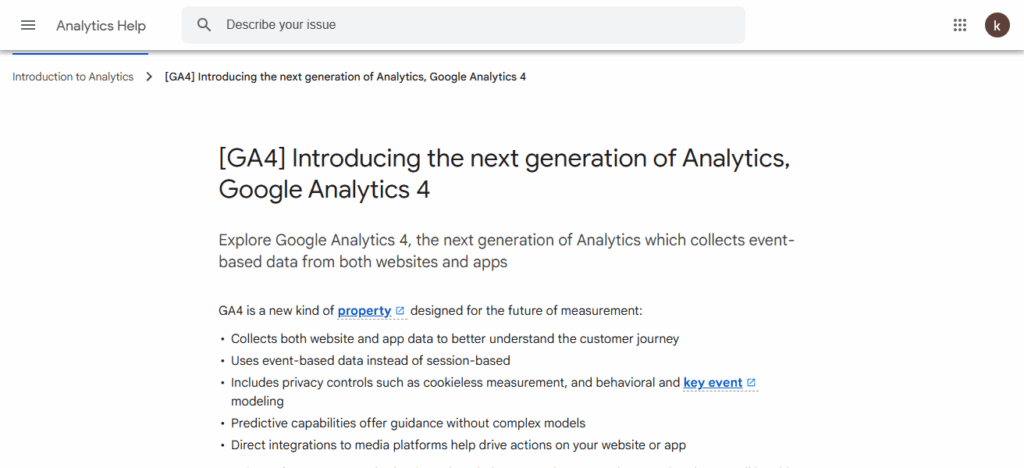
Super enhanced metrics such as cart event tracking and checkout behavior gives Google valuable impressions for ads accordingly where GA4 optimizes with unparalleled AI.
It fully syncs with Google Ads and BigQuery for campaign valuable audiences to integrate new high predictive marketing for GA4 enhanced Delta analytics solutions.
Features Google Analytics 4 (GA4)
Reliability – Forecast likelihood to buy, chance to cancel, and potential revenue using advanced machine learning.
Cross-Platform Tracking – Gain insight into users’ journeys across the web, mobile and apps and obtain a unified view.
Improved E-Commerce Events – Analyze specific user actions and behaviors when interacting with the product, cart, and during the checkout process.
Integration & Automation – Google Ads, BigQuery, and AI-driven detection of anomalies to streamline campaigns all offer no-hassle integration.
2. Mixpanel
Mixpanel leverages AI driven event based insight analytics to aid e-commerce companies to analyze shopping behavior to understand customers better.
The machine learning engine pinpoints behavioral engagement trends and user engagement outcomes, showing Mixpanel funnel analysis to highlight where customers drop off.
The retention analysis Pinpoints behaviors that lead to customers repeating purchasing. The platform includes sophisticated insight automation
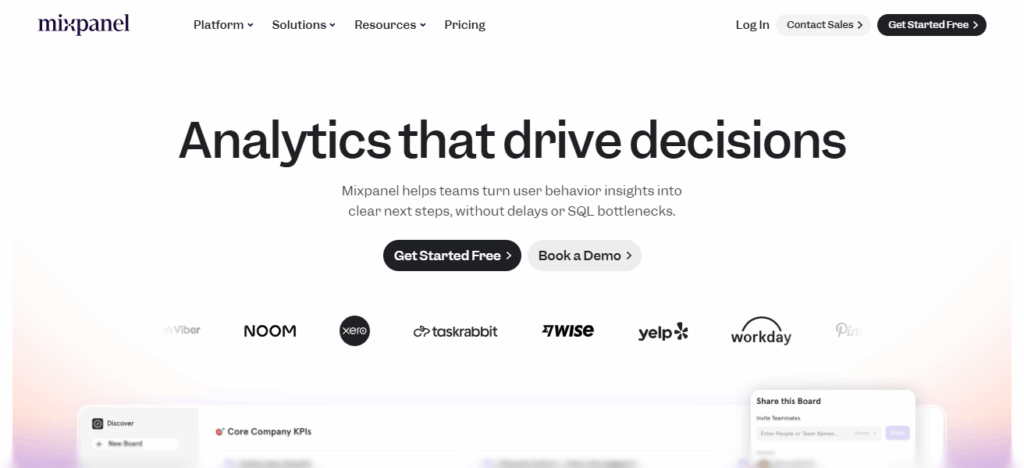
Segmenting, A/B testing, and retention behaviors to aid companies in fine tuning customized product page s and marketing checkout channels.
Analytics from Mixpanel allow even technical novice teams to explore and understand data, with knowled geable dashboard.
Mixpanel enables e-commerce stores to gain behavioral insight to enhance customers lifetime value, conversion, and enhance shopping experience with fast data processing versatility.
Features Mixpanel
Behavioral Analytics – Captures what actions users take and when, as well as predicting what actions they may take in the future.
Funnel & Retention Analysis – Finds points where users are dropping off and what may cause them to stop interacting; discovers what may drive a user to complete a purchase multiple times.
Advanced Segmentation – Tailors specific campaigns for individual users.
AI-Powered Insights – Machine learning identifies trends and patterns that are often overlooked, and turns them into actions.
3. Heap Analytics
With event and user activity scoping analytics, and automation of user and activity visibility recording and archiving user activity that includes event recording,
Heap dynamically enables e-commerce stores to access full data environment without event tagging that is manual.
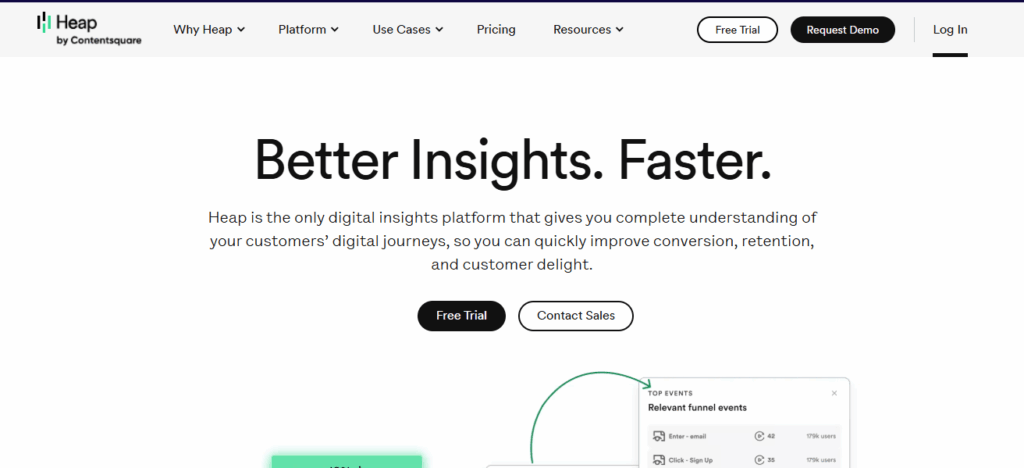
The AI based engine automates interaction trend, conversion hindering, friction point identification, and user initiation that improves overall experience
Augmented revenue potential, and aids user activity, navigation. Heap empowers teams with smart faster, automated decision making.
Features Heap Analytics
Automatic Event Tracking – No need for manual tagging; every user interaction is captured.
Funnel & Journey Analysis – Demonstrates how a user makes the journey from product view to purchase.
AI-Based Recommendations – Offers suggestions for user experience and conversion improvements.
Retroactive Analysis – With forecasting capabilities, you can analyze past data.
4. Hotjar
Hotjar is an AI-powered visual analytics tool for e-commerce websites. Through a combination of heat maps, scroll maps, session recording, and artificial intelligence, it determines where users stop, focus, and drop off.
AI functionality processes thousands of sessions to pinpoint patterns and troubleshooting issues to increase conversions. Through sentiment analysis, frustration, and feedback surveys, Hotjar surveys customer sentiment.
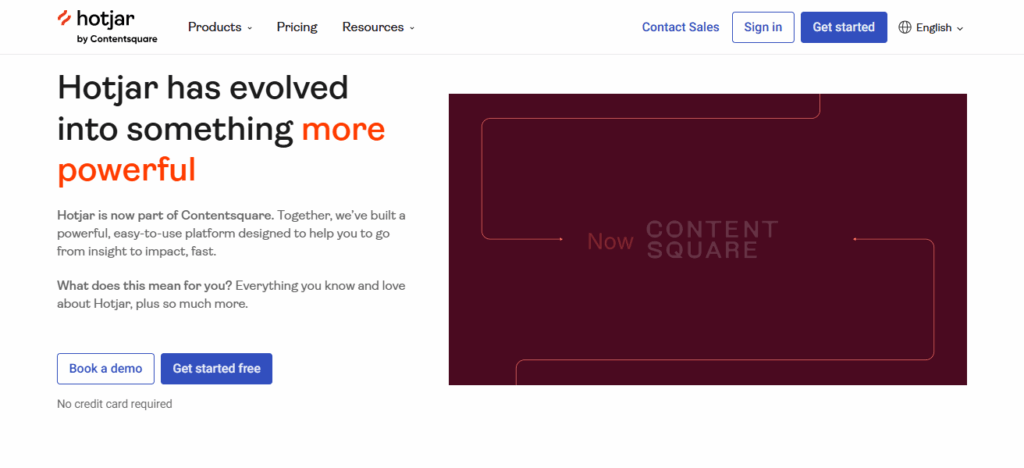
By analyzing this data, e-commerce brands are able to optimize product pages, clear checkout flows, and enhance the overall user experience. Hotjar is great for teams who want smart visual behavior analytics.
Features Hotjar
Visual Analytics – Heatmaps, scroll maps, and click tracking show user engagement.
Session Recordings – Recordings that have been analyzed by AI, emphasizing usability gaps.
Feedback & Surveys – Sentiment analysis captures user satisfaction.
Pattern Detection – AI recognizes key behavior patterns that impact conversion.
5. Crazy Egg
Crazy Egg offers e-commerce businesses a behavior analytics tool that uses AI-enhanced heat, scroll and click maps to elevate website performance.
With machine learning insights, engagement patterns and problem areas are identified. Then, the system suggests improvements to increase conversions.
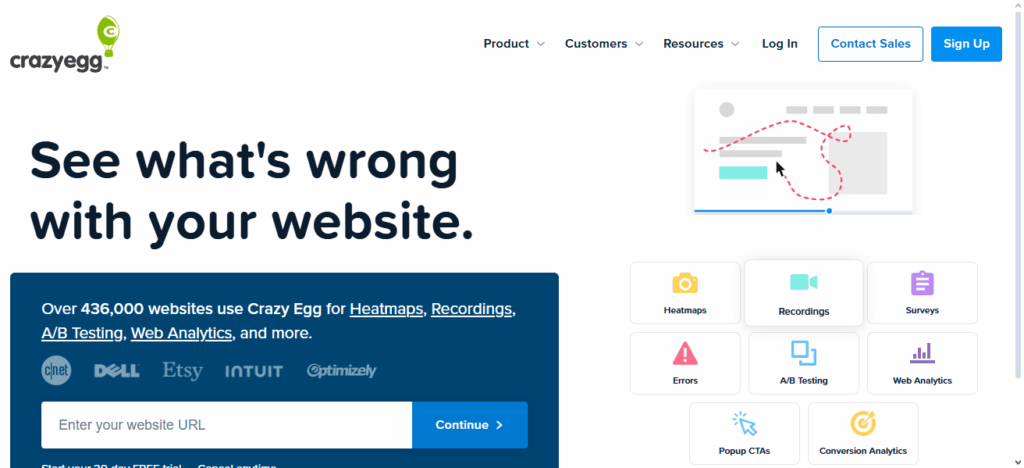
Session replay and Confetti and Overlay reports help users visualize navigation issues and Monitor segmented traffic to see behavior across a site.
AI-enhanced tools for A/B testing and quick data deployment help brands optimize user experience and sales funnel.
Features Crazy Egg
Heatmaps & Click Tracking – How users interact with particular pages is displayed.
Segmented Reports – Reports show behavioral variations by traffic source or demographic.
AI Suggestions – Areas needing design and UX enhancements are suggested.
A/B Testing – Facilitates evidence-based tests aimed at conversion improvement.
6. Kissmetrics
Kissmetrics applies behavioral analytics attributed by AI, as well as revenue attribution, tailored specifically for e-commerce brands.
Kissmetrics tracks individual users, cohort trends, and LTV (customer lifetime value) to understand what motivates a business to drive repeat purchases and customer loyalty.
Its machine-learning algorithms detect retention signals, predict high-value customers, and expose funnel blockages.
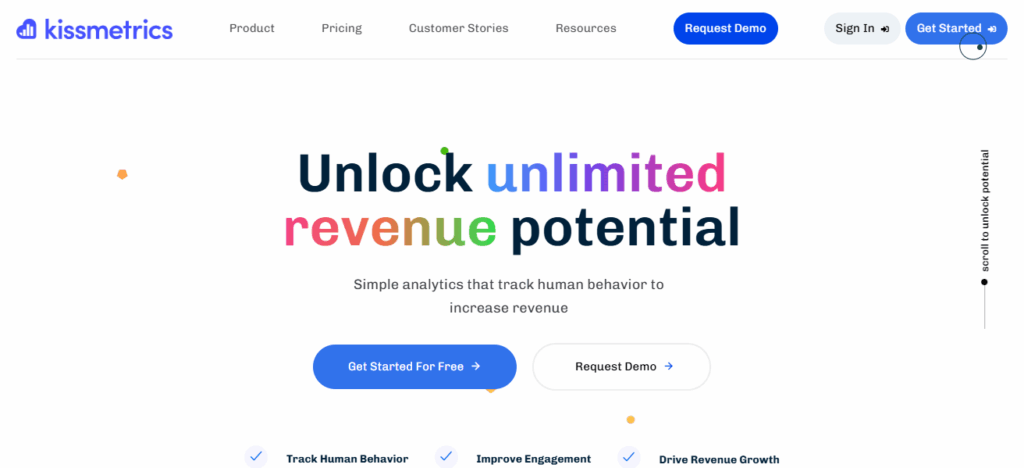
Kissmetrics makes product data, channel ROI, and customer behavioral patterns clear. Automated segmentation and custom reporting assist marketers in personalizing campaigns to boost conversion.
Primarily focused on revenue and customer lifetime value, Kissmetrics is well suited for scaling e-commerce companies.
Features Kissmetrics
Customer Journey Tracking – Tracks users over time and across different sessions and channels.
Cohort & Retention Analysis – Recognizes patterns and lifetime value for various cohorts.
Predictive Analytics – Identifies potential highly valuable customers and customers likely to churn.
Revenue Attribution – Connects certain actions to campaign ROI and performance.
7. Piwik PRO (Matomo)
Piwik PRO is Matomo, a privacy analytics platform with AI insights for data-sensitive e-commerce businesses.
Behavioral analytics, segmentation, and predictive modeling are provided while retaining data ownership within the brand.
AI anomaly detection, user action forecasting, and improvement opportunity identification are provided for product pages and checkout page footers.

GDPR compliance tools such as heatmaps, session recordings, consented tracking, and data-protected tools are also provided.
Custom dashboards, self-hosting options, and compliance with advanced analytic privacy and security make Piwik PRO Matomo an excellent fit for those brands.
Piwik PRO (Matomo)
Privacy-Focused Analytics – Data is fully owned, with tracking being GDPR compliant.
Behavioral Insights – AI detection of anomalies and conversion bottlenecks.
Session Recordings & Heatmaps – Visual aids for optimizing user behavior.
Custom Dashboards – Comprehensive reporting and predictive analytics for eCommerce.
8. Zoho Analytics
E-commerce teams can use Zoho with integrated AI and NLP to ease their data exploration processes.
Question Zia, the AI assistant, and she instantly produces charts, predictions or reports. Zoho integrates with platforms like Shopify,
WooCommerce, Amazon, and marketing sites to streamline the data from your sales, customers, and campaigns.
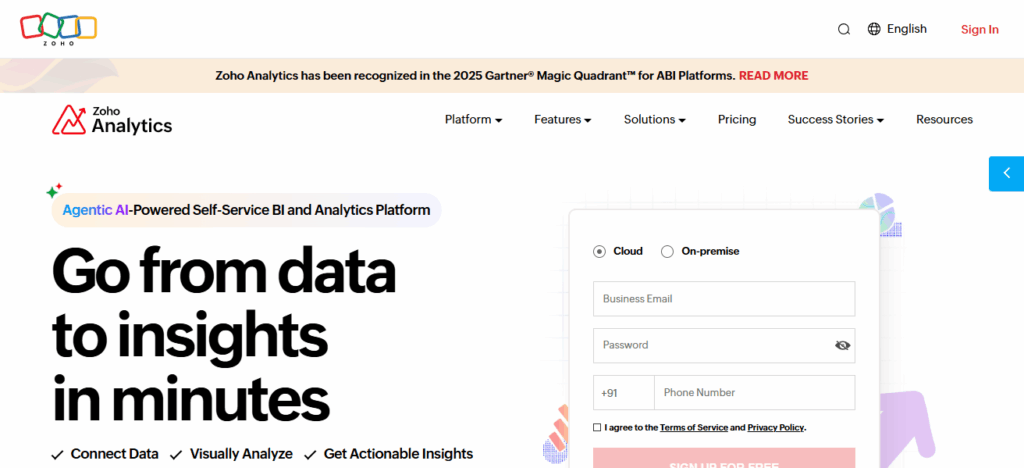
AI-driven forecasting estimates revenue and helps find the profitable, high-risk, or churnable segments, as well as the products in demand.
It also detects significant deviations from expected marketing performance and provides enhancing opportunities.
Zoho Analytics offers customizable dashboards and great automation which is perfect for rapidly growing online businesses.
Zoho Analytics
AI Assistant (Zia) – Assists with retrieving and generating reports based on users’ queries.
Multi-Platform Integration – Helps integrate with platforms such as Shopify, Woocommerce, Amazon, and other marketing applications.
Predictive Forecasting – Able to forecast revenue, churn risks, and product demand.
Anomaly Detection – Helps find hidden patterns that can lead to optimization.
9. Tableau (with AI extensions)
With the Add-on AI tools Pulse and Salesforce Einstein Discovery, Tableau is transformed into a powerful e-commerce analytics tool.
These AI add-ons allow for predictive modeling, data insight, trend automation, and explanation of insights. Merged with ML-driven visualizations, e-commerce brands use Tableau to analyze and forecast customer journeys, demand, and conversion.
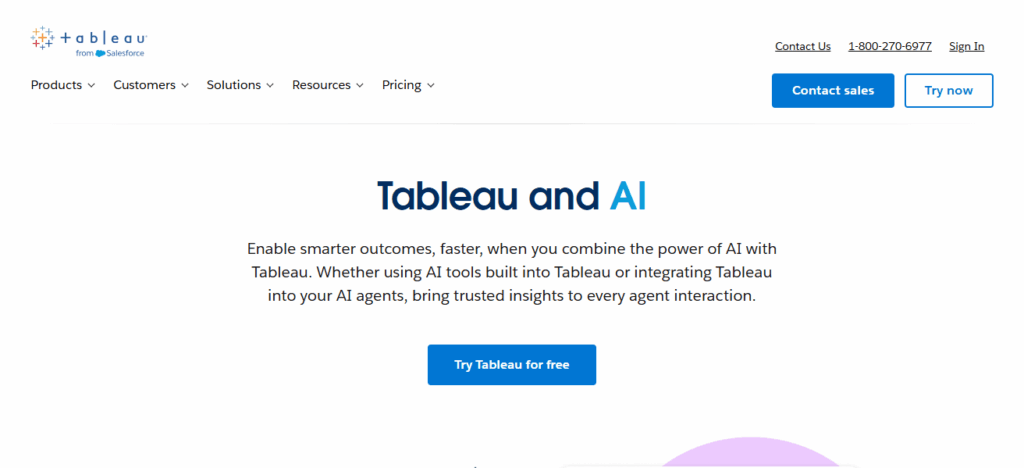
Tableau integrates data from many sources: ads, CRM, store platforms, and logistics, and offers it in interactive dashboards for complete data analysis.
Its AI tools also identify patterns and provide action recommendations, which is why teams with predictive patterns and actionable insight like Tableau.
Tableau (with AI Extensions)
Predictive Modeling – Forecasting trends and customer behavior using AI extensions.
Natural Language Insights – Users can pose questions and receive AI-generated visual answers.
Multi-Source Data Integration – Merging of CRM, advertising, store platforms, and logistics.
Anomaly Detection & Recommendations – Identifying issues with AI and proposing optimization solutions.
10. Adobe Analytics
Adobe Analytics has advanced e-commerce reporting methodologies augmented by Adobe Sensei, their analytical AI.
The platform analyzes real-time journeys of individual customers, makes user behavior predictions, and performs automation on advanced segmentation.
Its AI identifies conversion opportunities, anomalies, and various patterns of product performance across the web, mobile, and marketing channels.
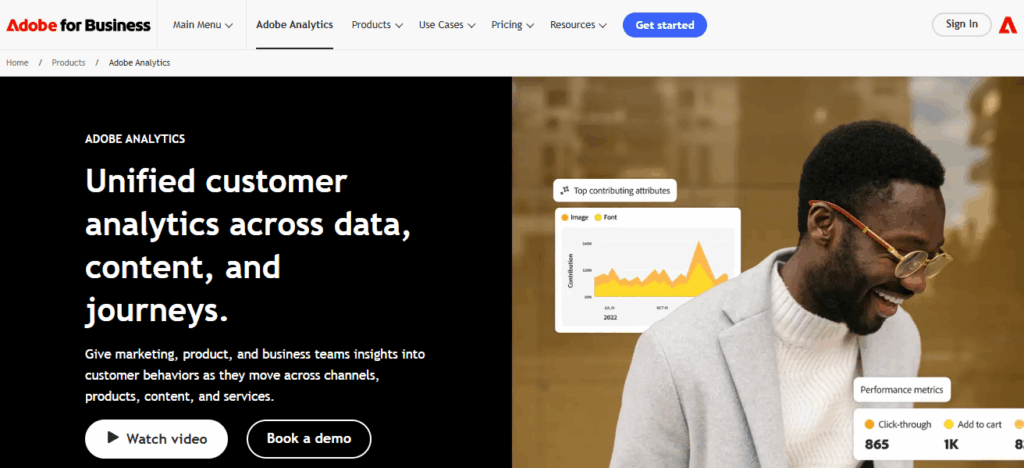
Adobe Analytics makes multi-channel attribution and in-depth analysis of audience segments while automating insight generation that offers unique visibility into the shopping intent and lifetime value of a customer.
Seamless integrations with Adobe Commerce, Target, and Experience Cloud offer businesses a complete ecosystem for personalization and optimization purposes.
Powerful AI-driven intelligence makes Adobe Analytics an ultimate choice for large-scale e-commerce businesses.
Adobe Analytics
AI Analytics, Journey Orchestration – Real-time behavior tracking and predictive modeling using Adobe Sensei.
Automated Segmentation – Identifying audience segments and purchase patterns.
Multi-Channel Attribution – Performance evaluation regarding web, mobile and marketing.
E-Commerce Optimization – Insights related to product performance, conversion rate and personalization.
Conclusion
To wrap up, all the platforms driven by AI technology, such as GA4, Crazy Egg, Hotjar, Mixpanel, Tableau, Piwik, Zoho, Heap,
Adobe and Kissmetrics, strengthen e-commerce performance by improving the comprehension of the user’s behavior and optimizing the user experience, boosting the change rate through predictive trend analysis.
These platforms merge automated analytics with machine learning and predictive insights to convert raw data into actionable strategies to empower the company to grow through smart, data-driven decisions.
FAQ
What are AI-powered website analytics platforms?
AI-powered analytics platforms use machine learning and predictive models to track user behavior, forecast trends, and optimize e-commerce performance.
Why should e-commerce businesses use them?
They help understand customer journeys, improve UX, increase conversions, and make data-driven marketing decisions.
Which platforms are popular for AI analytics?
Top platforms include GA4, Mixpanel, Heap, Hotjar, Crazy Egg, Kissmetrics, Piwik PRO, Zoho Analytics, Tableau, and Adobe Analytics.
Can these platforms predict customer behavior?
Yes, AI features forecast purchase probability, churn risk, and revenue trends.
Are these platforms suitable for small businesses?
Many, like GA4, Hotjar, and Zoho Analytics, are scalable and affordable for small to large e-commerce stores.









